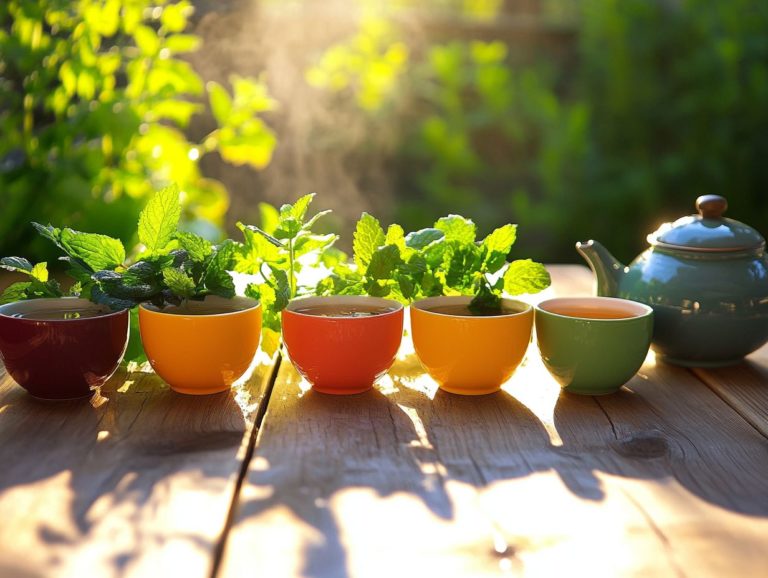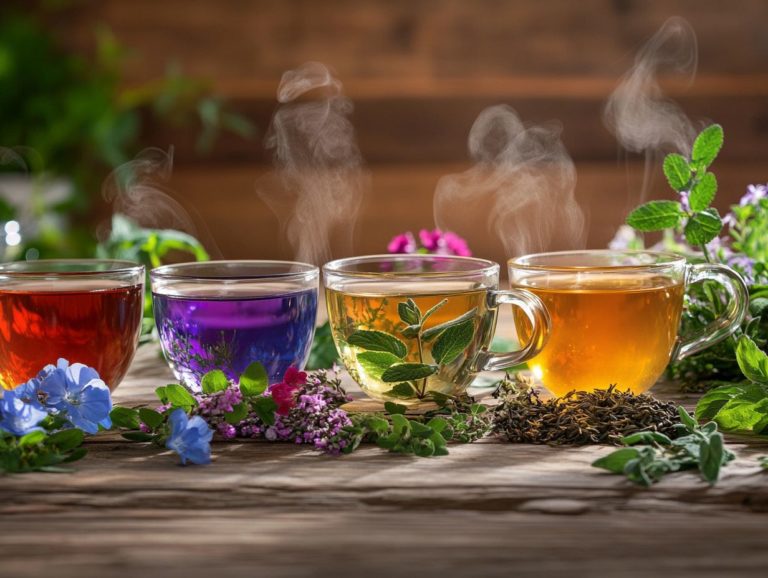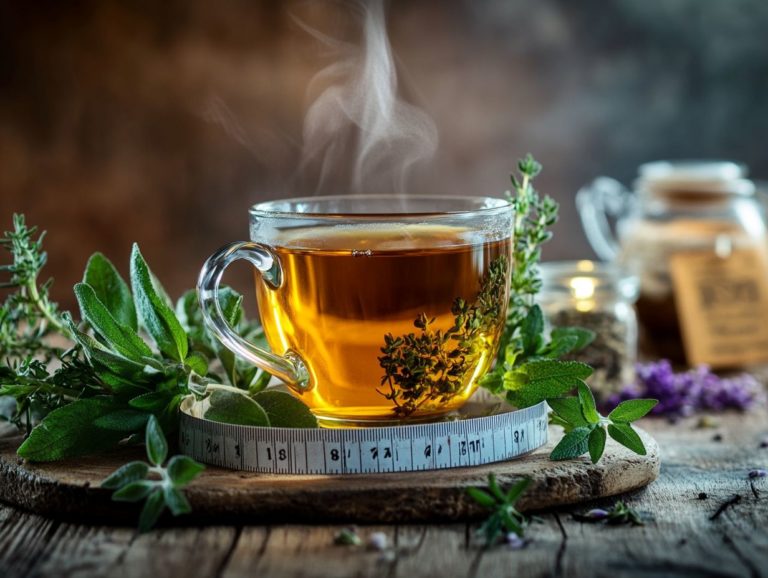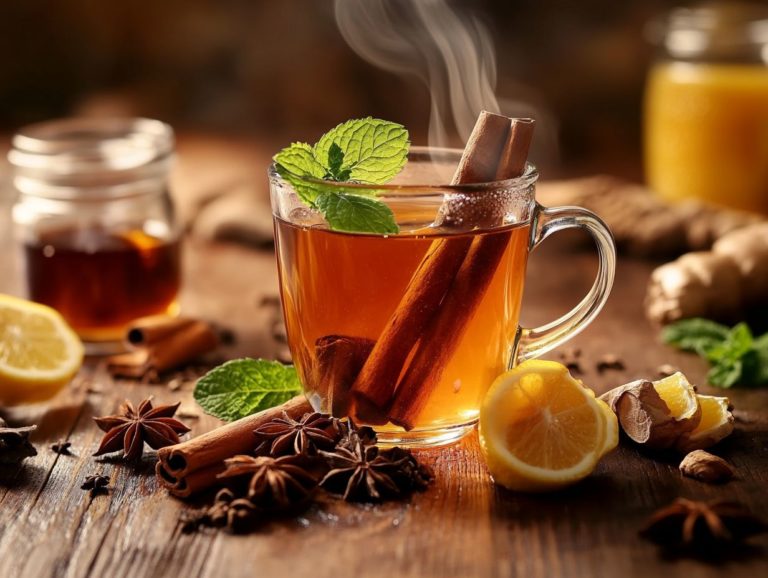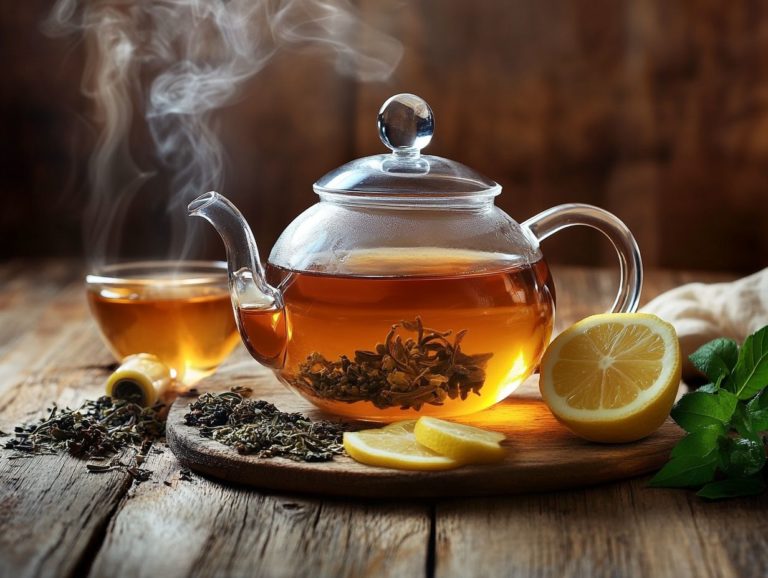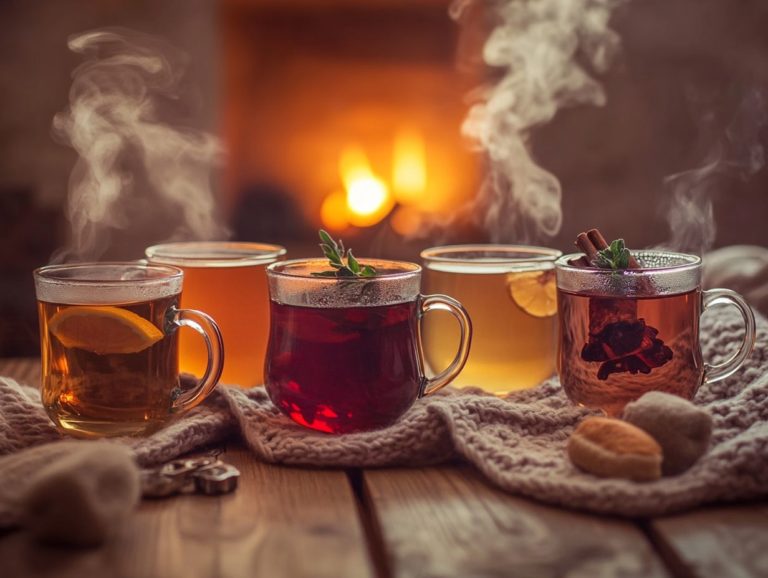Herbal Tea for Skin Nourishment: Top Herbs
Are you seeking a natural method to elevate your skin’s health? Herbal teas could be the solution you’ve been yearning for.
Rich in antioxidants and essential nutrients, specific herbs can nourish your skin from the inside out.
Discover the top herbs that will transform your skin! This article offers a detailed guide on how to brew the perfect herbal tea. It also explores other ways to enhance your skincare routine.
Learn how to select the ideal herbal tea tailored to your skin’s unique requirements. Unlock the secrets of herbal tea for a radiant complexion!
Contents
- Key Takeaways:
- Top Herbs for Skin Nourishment
- How to Make Herbal Tea for Skin Nourishment
- Other Uses of Herbal Tea for Skin Nourishment
- Choosing the Right Herbal Tea for Your Skin
- Frequently Asked Questions
- What are the top herbs used in herbal tea for skin nourishment?
- How can chamomile in herbal tea benefit the skin?
- What is the role of rose hip in herbal tea for skin nourishment?
- Can nettle in herbal tea improve the appearance of the skin?
- How does burdock root in herbal tea benefit the skin?
- Is dandelion root in herbal tea safe for all skin types?
Key Takeaways:
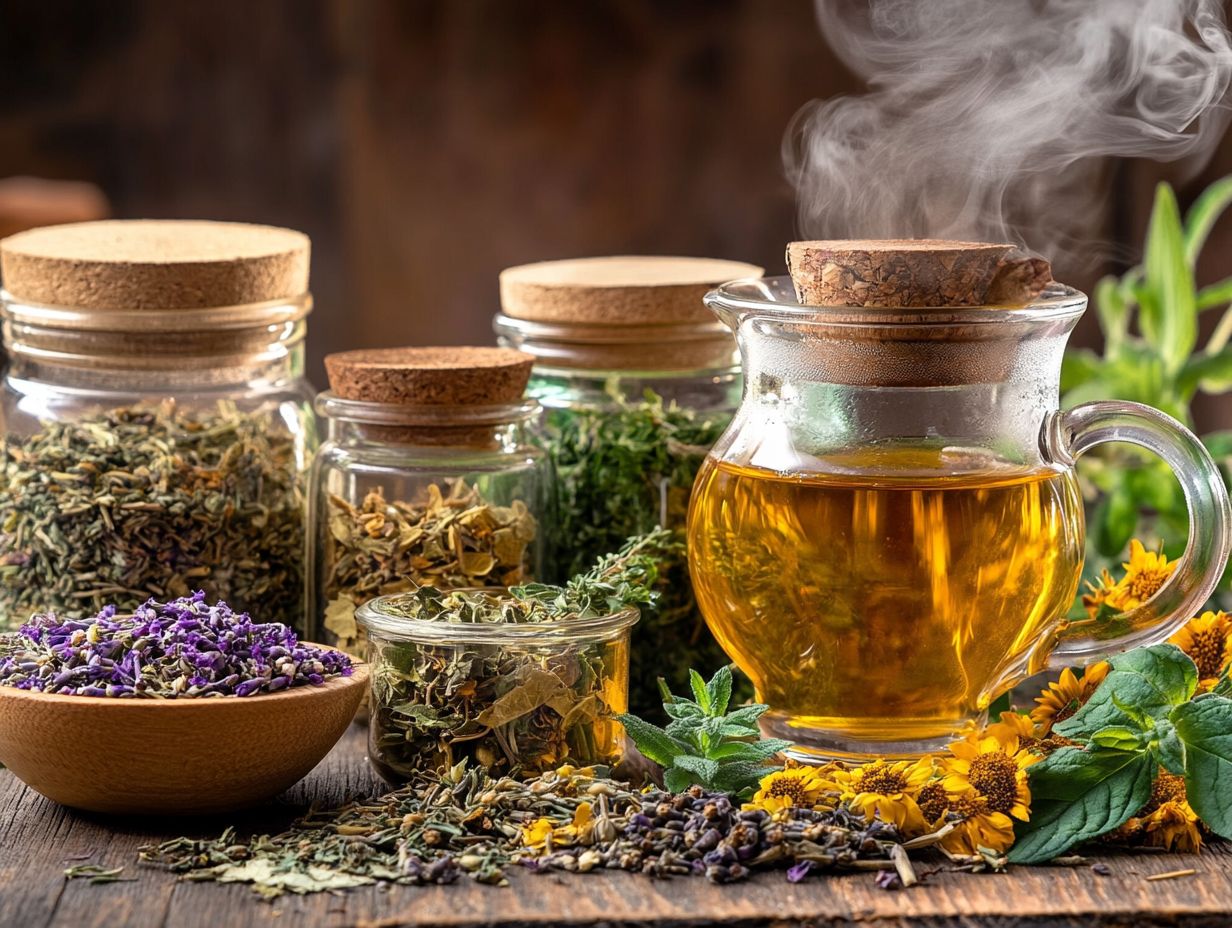
- Drinking herbal tea is a natural and effective way to nourish your skin from within, providing numerous benefits for overall skin health.
- Some of the top herbs for skin nourishment include chamomile, rosehip, and calendula, each with their unique benefits such as anti-inflammatory and antioxidant properties.
- When making herbal tea for skin nourishment, it’s important to follow a step-by-step guide and consider factors such as the quality of herbs and steeping time.
What is Herbal Tea for Skin Nourishment?
Herbal tea for skin nourishment is a delightful realm of infusions sourced from various plants, each with its own unique health-boosting benefits that contribute to achieving radiant, healthy skin. This practice dates back to ancient medicine, including the use of chamomile and peppermint, where traditional remedies were crafted to elevate wellness routines and harness the natural goodness of plant-based ingredients.
Choices like chamomile, peppermint, and ginger not only tantalize your taste buds but also deliver substances that help protect your body from damage, essential for skin health, fighting off free radicals, and strengthening your immune system.
These herbal elixirs have long been celebrated for their myriad benefits that extend well beyond simple hydration. Take chamomile, for example; it s famous for its calming effects, soothing irritated skin, and providing anti-inflammatory properties that reduce redness while promoting healing.
Peppermint, with its invigorating scent, revitalizes your senses and enhances circulation, resulting in a brighter, more youthful complexion. Meanwhile, ginger is a powerhouse of anti-inflammatory and antioxidant properties, effectively battling the signs of aging and leaving your skin looking fresh and rejuvenated.
By weaving these herbal teas, including sage and rooibos, into your daily routine, you can draw upon centuries of traditional wisdom, enhancing your skin health in a natural and delightful way. For more specific techniques, explore how to create herbal skin treatments at home.
Top Herbs for Skin Nourishment
In the realm of skin nourishment, certain herbs truly shine with their exceptional benefits, each providing unique health advantages that elevate your skin’s vitality. While herbal teas like chamomile, peppermint, and ginger have garnered well-deserved praise, don t overlook the contributions of hibiscus, echinacea, rooibos, and sage.
These remarkable herbs are brimming with antioxidants, which promote skin health, and anti-inflammatory properties, effectively tackling skin issues and enhancing your complexion.
Embracing these herbal allies can be a transformative step in your journey toward radiant skin. Start your journey to healthier skin today with these amazing herbal teas!
Benefits of Each Herb
Discover how each herb in your tea can transform your skin health and overall well-being! Each herb in your herbal tea collection brings unique advantages that contribute to skin health and wellness, such as nausea relief from Ginger tea. This makes them essential to your skincare routine.
Take Chamomile, for instance; it s celebrated for its calming effects and ability to improve sleep quality. Peppermint offers a refreshing zing while supporting digestive health. Ginger is known for its anti-inflammatory properties, and Hibiscus is packed with antioxidants that promote skin hydration and elasticity.
The antioxidant power of Hibiscus is particularly noteworthy; it helps fight off harmful particles that speed up skin aging. Chamomile soothes redness and irritation. It also helps you feel calm, enhancing your skin’s vitality.
By weaving these herbs into your daily life, you can embrace a complete way to take care of your health that addresses skin concerns and broader health issues. As these herbal infusions work in harmony, expect to see a significant boost in your skin’s natural glow while maintaining optimal inflammation control and hydration levels. Explore the 5 best herbal teas for hydration to enhance your wellness journey.
How to Make Herbal Tea for Skin Nourishment
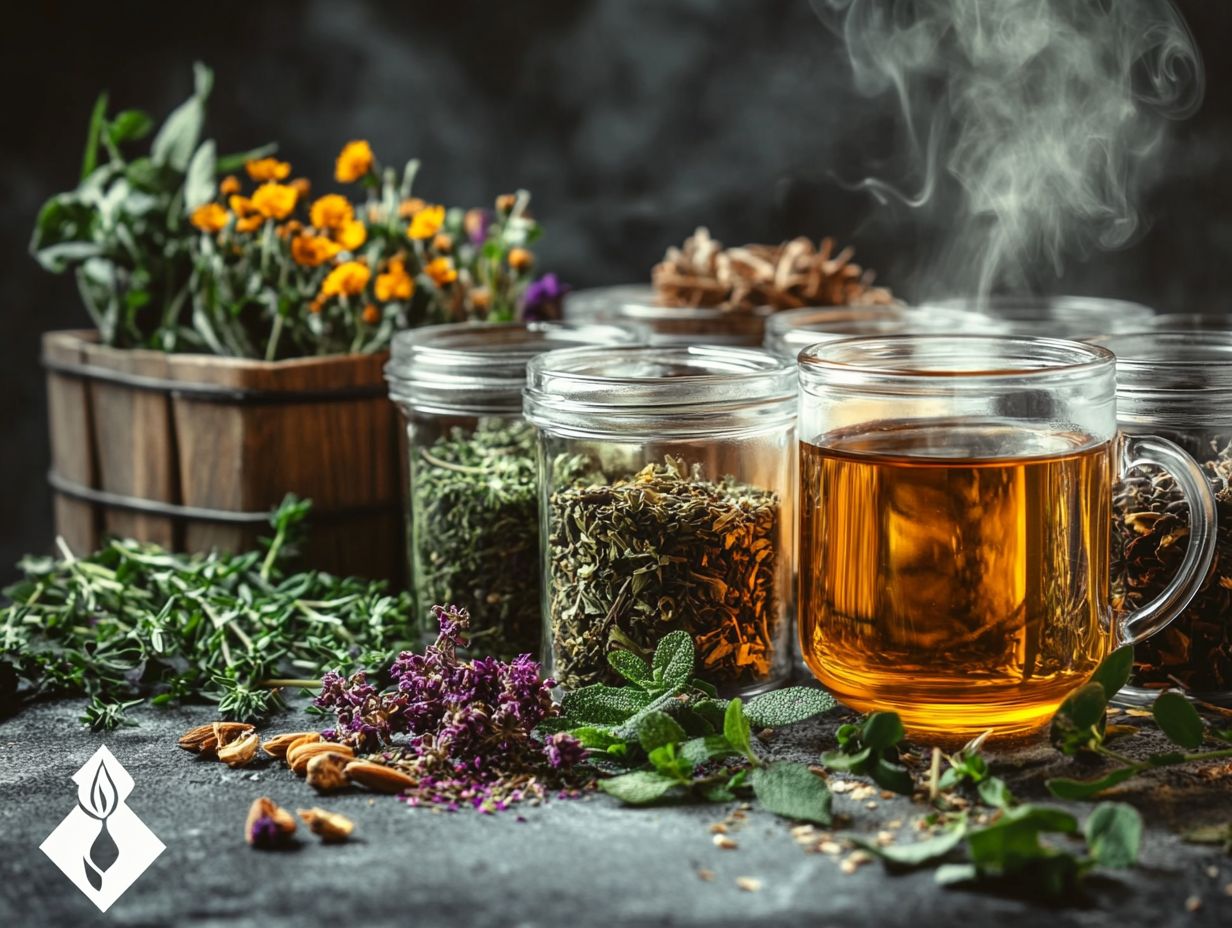
Making herbal tea for skin nourishment is easy and rewarding! Your journey begins with the selection of your preferred herbal blend perhaps the soothing notes of chamomile, the refreshing zing of peppermint, or the invigorating kick of ginger.
Each of these herbal teas boasts distinct properties that elevate your wellness routine, such as improving sleep quality and supporting digestive health. By adhering to a few essential steps, you can craft delightful infusions that tantalize your taste buds while enhancing your overall skin health. For more on this, explore herbal tea: a natural approach to wellness.
Step-by-Step Guide
To craft the perfect herbal tea for skin nourishment, follow this step-by-step guide, which highlights essential techniques and tips to maximize your health benefits.
Start by boiling water to the best water temperature for your chosen herbal teas whether it’s Chamomile tea, Peppermint tea, or Ginger tea as this enhances the extraction of antioxidants and health-promoting properties.
Next, measure out the appropriate amount of herbs and let them sit for the right time to unlock their full potential. Don t hesitate to experiment with different combinations of herbs like Turmeric or Aloe Vera to create unique benefits tailored specifically to your wellness routine.
For instance, blending calming lavender with rejuvenating nettle can yield a tranquil yet nourishing infusion that supports skin vitality. Aim for a ratio of one teaspoon of dried herbs per cup of water, adjusting based on your personal taste preferences. You might also explore herbal detox tea recipes for cleansing to enhance your wellness routine.
After boiling, allow the water to cool slightly to around 200 F for delicate herbs like chamomile, steeping for about 5 minutes. For heartier herbs like ginger, you might find that a longer steep of 10 minutes works wonders. Each flavor and health benefit unfolds with these nuances, inviting you to discover a blend that truly resonates with your personal wellness journey.
Other Uses of Herbal Tea for Skin Nourishment
Herbal teas offer more than just a delightful sipping experience; they play a vital role in skin nourishment and overall well-being, solidifying their place in your wellness routine.
These herbal infusions can be employed in numerous ways, from topical applications to enhancing relaxation and sleep quality. For instance, incorporating Chamomile tea into your face masks allows you to tap into its soothing properties, while savoring Ginger tea can bolster your immune system with its many health benefits. Additionally, exploring top herbal remedies for skin allergies can provide further relief and support for your skin health.
Additional Benefits and Applications
Herbal teas not only nourish your skin but also offer a wealth of benefits that elevate your overall well-being. They are an essential part of any wellness routine. Varieties like peppermint and ginger work wonders for your digestive health. Meanwhile, hibiscus is celebrated for its ability to help keep your blood pressure in check. The antioxidants in these teas shield your skin from environmental damage, enhancing its health even further.
Incorporating these brews into your daily practices can significantly boost your immune support. With options like Echinacea and ginger, you can enhance your body’s natural defenses effortlessly.
By sipping on herbal infusions, you’re not just supporting gut health and skin vitality; you’re engaging in a holistic approach that champions natural wellness. These teas are a vibrant reminder of nature’s bounty, encouraging healthier choices that resonate with your body’s needs and foster harmony between body and mind. To learn more about the different types and benefits, check out understanding herbal tea.
Choosing the Right Herbal Tea for Your Skin
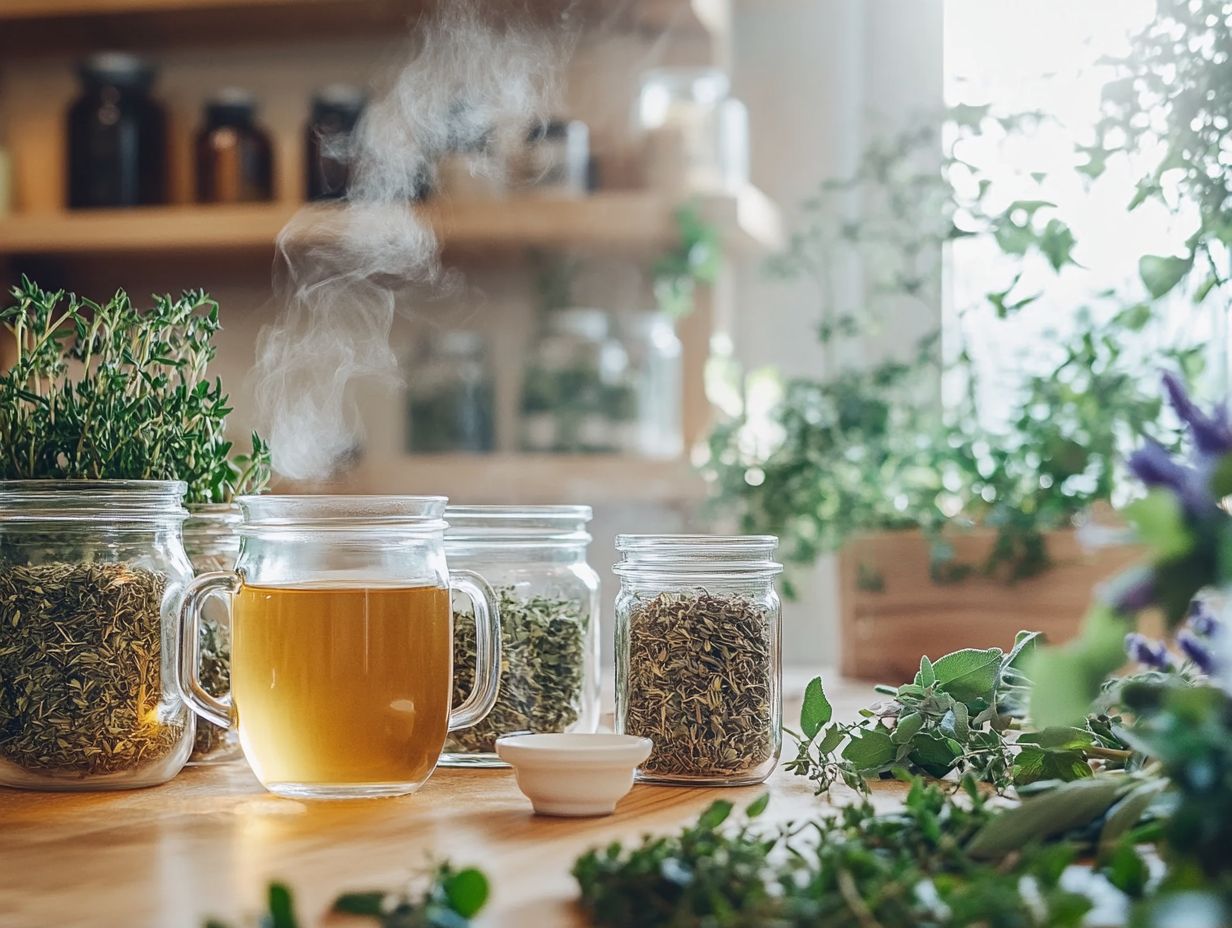
Selecting the ideal herbal tea, such as green tea or lemon balm, is crucial for unlocking health benefits and harmonizing with your wellness rituals. Consider your specific skin concerns be it inflammation or dryness as well as your personal preferences in flavor and aroma.
Familiarize yourself with the unique properties of different herbal teas. For example, enjoy the soothing effects of chamomile or the invigorating qualities of peppermint. You can explore 5 delightful DIY herbal teas for wellness to make enlightened choices that elevate both your skin health and your overall well-being.
Factors to Consider
When choosing the perfect herbal tea for skin nourishment, consider several key factors that align with your specific skin health goals. Start by evaluating your individual concerns be it dryness, acne, or inflammation. Different herbal teas offer unique benefits tailored to these issues.
For instance, chamomile shines at calming irritated skin, while hibiscus is renowned for its hydration properties and ability to enhance elasticity.
It’s also wise to think about any allergies or sensitivities you might have, as some herbs could trigger reactions in certain individuals.
If your skin tends to break out, green tea could be a stellar choice due to its antioxidant properties that help minimize oiliness and acne. Conversely, if you often deal with redness or sensitivity, calendula tea may provide the soothing relief you need. Additionally, exploring the top 7 herbs for immune-boosting teas can enhance your skincare routine.
Ultimately, the right herb depends on understanding your unique skin requirements and preferences. This awareness enables you to select a tea that nourishes your skin and complements your lifestyle and taste.
Frequently Asked Questions
What are the top herbs used in herbal tea for skin nourishment?
The top herbs include ginger, hibiscus, rooibos, chamomile, rosehip, nettle, burdock root, dandelion root, and calendula.
How can chamomile in herbal tea benefit the skin?
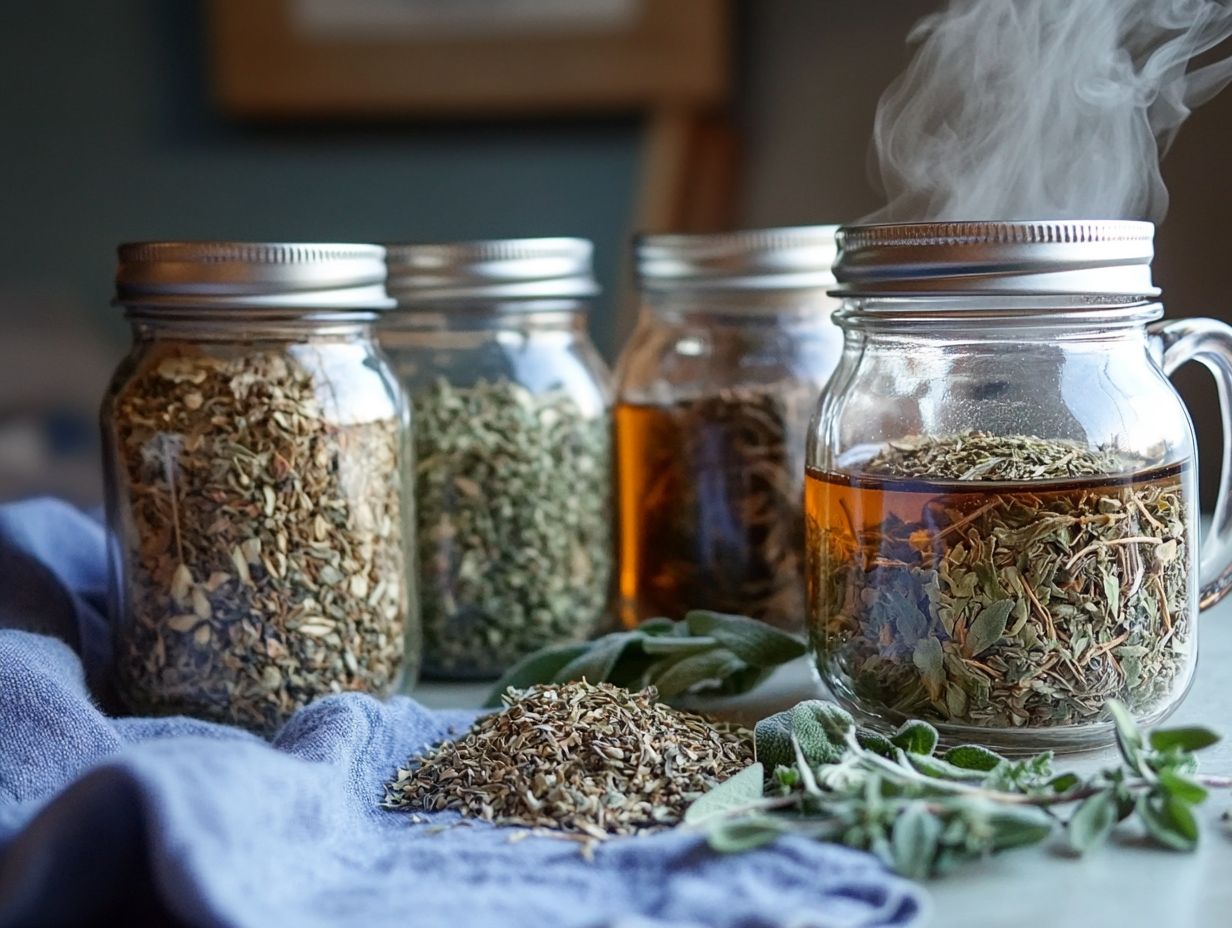
Chamomile soothes irritated skin and reduces redness, thanks to its anti-inflammatory properties. It also contains antioxidants that help slow down the aging process of the skin.
What is the role of rose hip in herbal tea for skin nourishment?
Rosehip is rich in vitamin C, which boosts collagen production and improves skin elasticity. It also contains essential fatty acids that help moisturize dry skin.
Can nettle in herbal tea improve the appearance of the skin?
Yes, nettle has been used for centuries to treat various skin conditions such as acne, eczema, and psoriasis. It possesses anti-inflammatory and anti-microbial properties that can improve the overall appearance of the skin.
How does burdock root in herbal tea benefit the skin?
Burdock root is known for its detoxifying properties, which can help clear up acne and other skin conditions caused by toxins in the body. It contains antioxidants that help fight free radicals and promote healthy skin.
Explore these herbal teas today and give your skin the nourishment it deserves!
Is dandelion root in herbal tea safe for all skin types?
Dandelion root is a natural ingredient that s safe for all skin types. It improves skin texture and tone, making your skin look and feel better.
It has anti-inflammatory properties that calm skin irritations. Enjoy the benefits of dandelion root in your herbal tea today!

